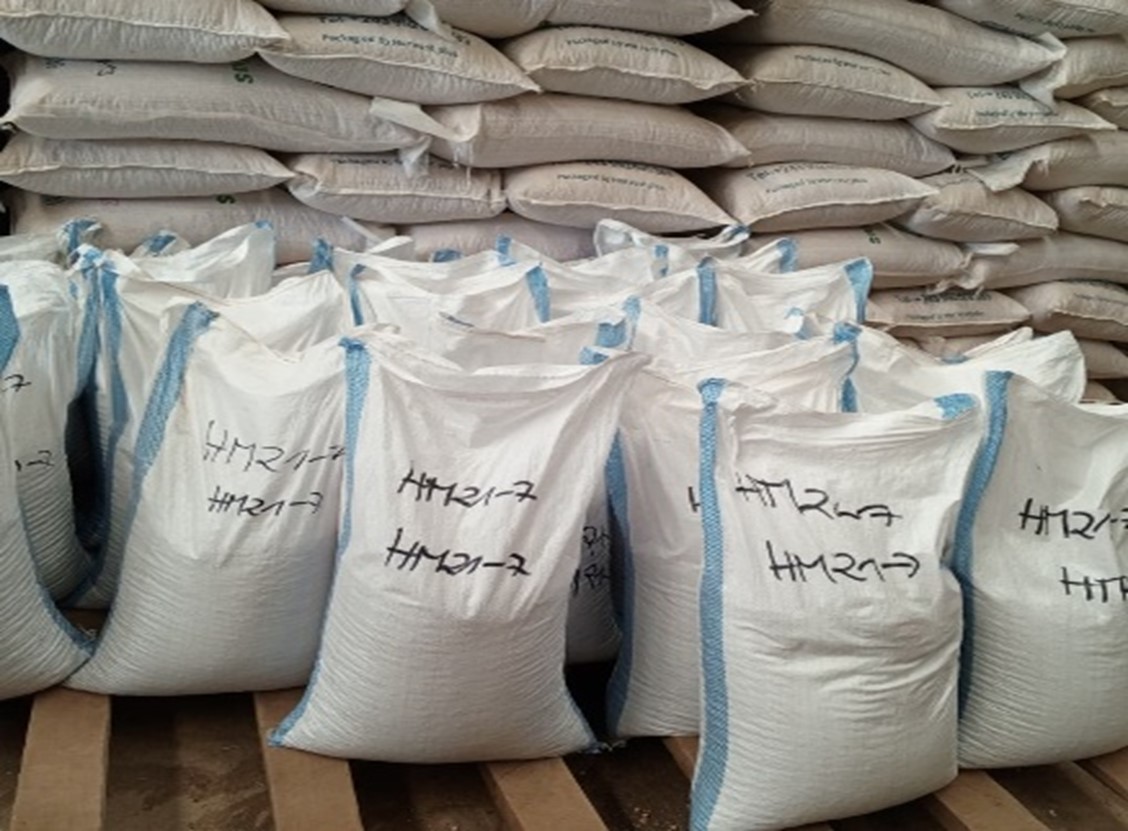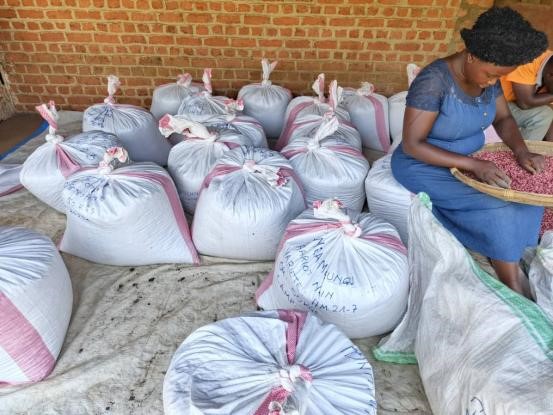By Lydie Mulonda, Bola Amoke Awotide, Jean Claude Rubyogo, Nepomuscene Ntukamazina, Napoleon Kajunju, Hosny Dunia, Lulu Lwamba, Richard Kataliko
Bean bags weighing 25 kilograms are more than just containers of seed. In Bukavu, they feel almost alive, as they are stitched, labeled, and lifted by hands that understand their value. Each sack carries the hopes of families preparing for a new season, the determination of a growing local industry, and the quiet but powerful dreams of rural women in Eastern Democratic Republic of Congo who see, in these seeds, a chance to reclaim autonomy and shape their own futures.
Between August 13 and September 4, 2025, the Beans for Women Empowerment (B4WE) Project launched a large-scale seed distribution campaign, mobilizing partners, researchers, and local communities. The initiative aimed to lay the groundwork for the 2025–2026 A-season agricultural campaign across the provinces of South Kivu, North Kivu, and Tanganyika.
B4WE is much more than an agricultural program. Its five components, seed systems, agribusiness, nutrition, land access, and gender, reflect a clear ambition: to make beans a tool for women’s empowerment. By facilitating access to quality seeds, supporting women-led businesses, and integrating gender-sensitive nutrition, B4WE is turning a food crop into a lever for social and economic change.
“Each bag of seed handed over is an open door to food security and empowerment,” says Lydie Mulonda, Senior Associate Researcher in charge of seed systems.
The seed journey: From Mulungu to remote villages of North Kivu, South Kivu, and Tanganyika
The seeds distributed come from National Institute of Agronomic Studies and Research (INERA) Mulungu, the national agricultural research hub responsible for producing foundation seeds.
The shipments were delivered in two waves. The first took place on August 13, 2025, when 1,300 kilograms (kgs) of the HM21-7 bean variety were sent directly to Kalemie. The second wave occurred on August 22, 2025, comprising 3,000 kgs across five varieties: 1,600 kgs of HM21-7, 150 kgs of Mukemwema, 450 kgs of Pigeon Vert–Marungi, 250 kgs of CODMLV106, and 550 kgs of G59-1-2. This second batch was received for distribution to North and South Kivu.
After weighing, repackaging, verification, and packaging, 120 bags of 25 kgs were prepared at Alliance of Bioversity international and CIAT’s warehouses in Bukavu, with the support of the Christian Initiative for Community Development (ICDC).
But transporting these seeds to the beneficiary territories was a challenge.
Insecurity, blocked roads, and the impassability of the Bukavu–Uvira route forced the teams to detour through Rwanda, Tanzania, and Burundi – a detour that illustrates the obstacles any agricultural initiative in the region must face.
Three provinces, hectares of hope
In South Kivu, AGRIFORCE, a seed marketing company in Kabare received 390 kgs of HM21-7 and Mukemwema. In Walungu, GAP-KIVU received 220 kgs, including the local variety SCR26. On Idjwi Island, CPR-Idjwi received 220 kilograms, including Pigeon Vert and Mukemwema. Altogether, these 830 kgs of seed will be used to establish 11 hectares of multiplication fields.
In North Kivu, in Rutshuru, the organization AJECEDEKI will cultivate four varieties over 20.4 hectares, including 720 kgs of HM21-7 and 384 kgs of G59-1-2. In Masisi, the TUUNGANA Cooperative received 960 kgs, and in Nyiragongo, the NGO API took charge of 240 kgs.
Altogether, these 2,832 kgs of foundation seeds will be used to plant 26.4 hectares of first-generation seed plots.
In Tanganyika province, nine implementing partners, including BDEP, COPCOPAT, UFMD, Femmes Handicapées, and ACHS Dev, received exclusively 1,280 kgs of the HM21-7 variety. The seeds, distributed across Kalemie, Moba, and Nyunzu, will open up an additional 16 hectares.
In total, 53 hectares will be sown thanks to this operation, with 2,900 kilos of HM21-7 for 36 hectares, 150 kgs for 2.5 hectares for the Mukemwema variety, 450 kgs for 5.6 hectares for Pigeon Vert (Marungi), 250 kgs for 3 hectares for CODMLV106, and 550 kgs for 6.8 hectares for the G59-1-2 variety.
The projections are ambitious: around 28,470 kgs of seed for bush varieties (650 kg/ha) and 10,000 kgs of seed for climbing varieties (1,000 kg/ha). That’s a total expected output of nearly 38,470 kilos of certified first-generation seed, which will be used in the 2026 B-season February 2026 to open up 481 hectares of second-generation seed production in the three provinces. The second-generation seeds produced (384,800 kg) will benefit more than 15,000 women bean producers, giving access to biofortified beans to at least 105,000 people in the three provinces.
When seeds become a lever for empowerment
Yet these figures tell only part of the story. Behind each hectare are cooperatives, farmers’ organizations, women’s groups, and rural communities relying on these seeds to transform their daily lives.
In Kalemie, an association of women with disabilities is receiving a seed grant of this scale for the first time. In Idjwi, women farmers hope that the Mukemwema variety, known for its disease resistance and market appeal, will produce enough harvest to feed their families and generate income.
Sowing to resist, sowing to transform
In a region where insecurity and poverty have long hindered agricultural progress, the seed distribution carried out by B4WE, despite the still-difficult security context (especially with the escalation since January 2025 of the armed conflict between AFC/M23 and the Congolese army), demonstrates that it is possible to invest in sustainable solutions. Beyond the technical act, this is a collective effort of resilience and women’s empowerment taking root.
The seeds distributed in August and September 2025 will soon germinate across 53 hectares of land. But their most precious harvest will undoubtedly be that of trust: trust in the future, in rural women’s ability to lead change, and in the power of beans as a symbol of a new beginning.
Cover Image: A bean seed production activity in Rutshuru, where beans are being sorted in collaboration with TUUNGANA Cooperative




